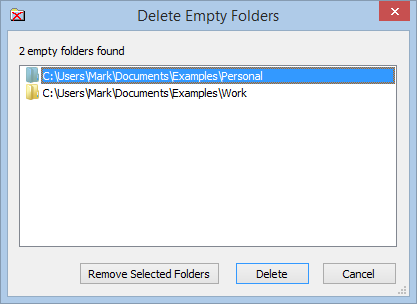The Delete Empty Folders command is used to safely remove empty folders from your hard drive.
This command will not appear if only files have been selected in File Explorer.
Note that a folder is considered to be empty even if it contains sub-folders, provided those sub-folders also contain no files.
When you select the Delete Empty Folders command, it scans the selected folder(s) and all sub-folders, looking for empty folders.
If only one folder is selected and it is empty, then it will be deleted.
Otherwise, this dialog is shown which lists the empty folders found.

You can press the Delete button to delete all the empty folders found, or you can select one or more of the folders in the list and then press the Remove Selected Folders button to just delete the folders you selected. Note: this button only appears once you have selected one or more folders in the list.
You can right click on any of the folders in this list, or a selection of folders, to bring up this context menu:

These commands let you do the following:
Explore |
Opens File Explorer showing the selected folder. |
Remove From List |
Removes the selected folder(s) from the list. |
Delete |
Deletes the selected folder(s). |
Copy Path |
Copies the full path to the selected folder(s) to the clipboard. |
When to use Delete Empty Folders
This command is useful in two ways:
Helps to prevent accidental deletion of files
This command provides complete peace of mind if you ever want to delete a folder that you think is empty.
The usual Windows command to delete a folder will always delete any files and sub-folders that a folder contains.
By using the Delete Empty Folders command, you can be sure you are not accidentally deleting a folder that does contain some files.
Helps tidy folders after files have been deleted
Whenever files are automatically deleted, it is often the case that empty folders get left behind.
Possible ways that this can happen include:
•Developers using a source control system such as Perforce.
•Developers using project maintenance commands such as make clean
•Using Windows Search to find files and using the results list to delete files.